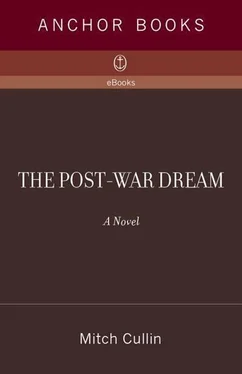“Metaphorical fascists, most of them,” Lon had said inside the hut, scratching at an earlobe with the rim of an empty Tecate can.
“How so?” Hollis responded.
“Lord, just take a good look at them sometime. Look how they act so damn smug, how they dress almost identically. Reminds me of ham actors all auditioning for the same lousy part.”
Lon sighed with disgust, shaking his head amid the shadows as Hollis said, “What the hell are you talking about? That's how we dress. It's golfing attire, Lon. What else are we supposed to wear?”
Lon's head-shaking transformed into an emphatic nodding. “Exactly,” he said. “That's my point right there. Hand me a beer, would you?”
In a way, they were like a pair of bothersome teenagers last summer, restless and hardly content, rippling still waters — withered adolescents racing their customized golf carts (Lon's black Humdinger, that prized miniaturized Hummer; Hollis's replica ‘57 Chevy, baby blue with canopy top, bucket seats, and coat frame), speeding on cart lanes, driving by parks where the only children they ever saw were attentive retirees strolling beside a feeble parent. Few streets were spared their wheels, their fateful bleating horns which created such a ruckus beneath the palm tree rows — the clarion call of two men intent on sailing kamikaze golf balls through the air, shooting them at the roofs of uninhabited homes, where the balls landed hard on reddish-tiled shingles and quickly dropped into yards marked with for sale signs.
“How do you think they went, Hollis?” They had parked at the end of a cul-de-sac, bringing themselves to stand several yards away from three recently vacated homes — a Ponderosa, a Cheyenne, a Durango. Lon set a ball on the asphalt, squinting while he considered his target. “Think Alzheimer's caught up with them?”
“Maybe.”
Taking a stance like a pro, Lon readied his hulking body for the shot. “Or a massive coronary?”
“Could be.”
Coiling his knees, hips, and shoulders when turning into his backswing, Lon soon launched the ball neatly from the ground. “Or harboring grand-kids without the association's permission?”
“Beats me,” Hollis said, watching as the ball arched beyond them, curving downward, promptly striking the Cheyenne's roof with a thack — bouncing twice on the shingles, over the roof, out of sight.
“I'm putting my money on Alzheimer's. What about you?”
“I don't know,” Hollis replied. Could easily be a stroke, he thought.
Could be a fractured hip. Could be death absolute — like the rapid demise of fellow golfers who had swung their clubs near them, like Jeff Turman who scored an ace just minutes prior to total heart failure, his final words being, “Oh, boy — man, this really smarts,” before his eyes rolled back into his head and he collapsed while still clutching his five-iron. Or there was quiet, austere Chris Mayhew — complaining of a migraine during tee time, pressing thumbs against his temple — who had changed his mind about playing, deciding instead to return home; shortly thereafter, his wife found him in the living room while ESPN broadcast sports highlights, seemingly napping on his leather recliner chair but, in fact, quite dead (the migraine having apparently been the first rumblings of a cerebral aneurysm).
“Well, better him than us,” Lon had insisted after Mayhew's funeral, unaware then — relaxing inside the hut, reeking of Coppertone and alcohol — of the disease already consuming his prostate, a malignancy which would inevitably lead to the gland's elimination; it was a rather minor impasse in comparison to the more troubling plight of Debra, a common ordeal for the men of Nine Springs: “A tonsillectomy for the aged,” he would end up calling it. “A real pain in the ass, literally.” But throughout the summer Lon had exuded an able-bodied, robust bearing — always maneuvering to get ahead of Hollis while driving their respective carts, clapping louder than everyone else when Anita Mann, a Peggy Lee impersonator, performed at the Sun-palace Arena (the melody of “Is That All There Is?” stuck in his head for days following the concert, piping from him as an off-tune whistle whenever silence prevailed inside the hut) — then mocking the Grim Reaper with deftly aimed golf balls which pelted homes he envisioned as modern, spacious mausoleums.
At least three evenings a week were spent in the indigo hue of Nine Springs’ Starlight Grill, the pair sitting at the bar and cooling their sunburned foreheads with frigid swipes of dripping Corona beer bottles. They went on those nights when Mr. Tom Kat played his rhythm-laden Casio in the middle of the dance floor, taking requests and reviving the golden hits of yesteryear beneath a slow-turning mirror ball, crooning to the golf-tired patrons as his deep, often faltering voice was aided by repetitive, syncopated electronic beats. Only later in the summer did the small groups of college-age women breach the security gates of the community, appearing at the grill late into the evenings, dressed casually in cutoff jean shorts, tight T-shirts or tank tops; the girls were always accompanied by one or two tough-looking young men who kept themselves sequestered discreetly at corner tables — baseball caps pulled low or with the bills turned backward — watching apathetically as their female friends danced and sang and flirted with much older, more intoxicated men.
“See, look at that, there's the downside of Viagra,” Lon had joked, motioning his beer bottle at one of the girls slinking her way across the dance floor. “Right there in front of us, the inevitable by-product of our reborn hard-ons.”
“What do you mean?” Hollis asked.
“They're whores. We've got whores now.”
“Really?” Hollis said, squinting to peer out at the dance-floor crowd. “I had no idea.”
Another girl sang along to Tom Kat's rendition of “Moon River” — long black hair hanging past her eyes, skinny pale white legs illuminated with the streaking reflections of the mirror ball — as a retiree old enough to be her grandfather recorded her singing into a portable cassette player: the two swayed together on the dance floor, the man holding a microphone at her lips while she lazily wrapped both arms around his wide, hunched shoulders.
“My god, this town is pathetic,” Lon chuckled, shaking his head. “What am I doing here?”
And if the answer hadn't been learned early on, Hollis might have then asked Lon why it was he ever chose Nine Springs to begin with. The serenity of the desert, Lon had already told him when they first met on the driving range, their friendship sealed immediately with the knowledge that they had previously served their country with distinction (Hollis in Korea, Lon before him during the Bikini Atoll atomic tests). Moreover, Lon and his wife, Jane, had picked Nine Springs because of the weather — seven glorious months, two cold months, three months of hell — and to improve Jane's overall health (the dry air did wonders for her rheumatism, keeps her in the pink) and, of course, for the fully stocked pro shop, not to mention the rare chance of having a well-kept putting green twenty-five feet from the back porch. Plus, their only child, Michael, lived nearby in Tucson, running an antique shop with his long-term partner. “My boy's gay — lovely kid, though, really wonderful, and so is his companion, Ben. Anyway, the way I see it is that evolution has had enough of my gene pool — mine and Jane's — and probably for good reason, you know.”
But when it came down to the elegant yet cozy clubhouses, the fitness center, the world-class amenities — Lon couldn't stand any of it, especially after two or three drinks. “Contrary to what we want to believe, it's an America that never really was,” he had said, resting on an adjacent deck chair, lounging with Hollis beside the swimming pool at dusk. “Just a fantasy of something imagined in hindsight, hallucinated by folks desiring safer neighborhoods, tidy lawns, no noise. See, I didn't know I was fighting a war for this kind of outcome, didn't foresee ending up in a modern version of what some developer thought my country was once like. You know, it's like Disneyland — it's a theme park we've invested in, that's all. I mean, you realize there aren't any springs near here. I bet they draw these names from a couple of hats. Oak — Ridge. Saddle — Springs. Nine — Oak. Saddle — Ridge. Nine — Springs. Really, honestly, it should be called Eighteen Holes.”
Читать дальше










![Theresa Cheung - The Dream Dictionary from A to Z [Revised edition] - The Ultimate A–Z to Interpret the Secrets of Your Dreams](/books/692092/theresa-cheung-the-dream-dictionary-from-a-to-z-r-thumb.webp)

